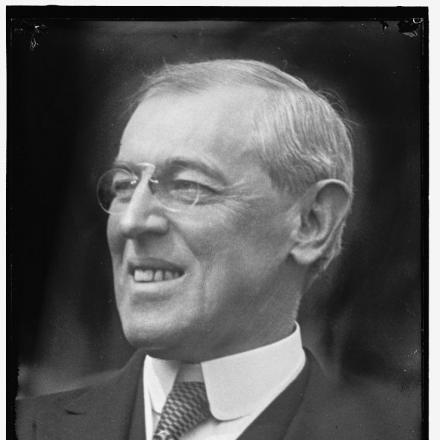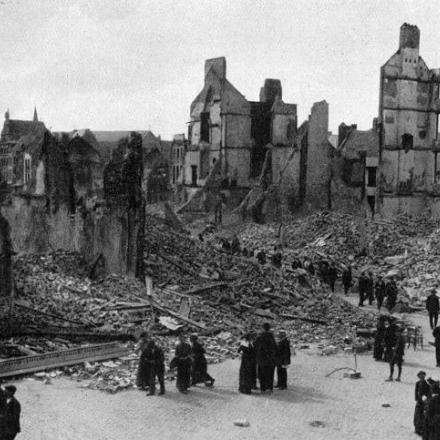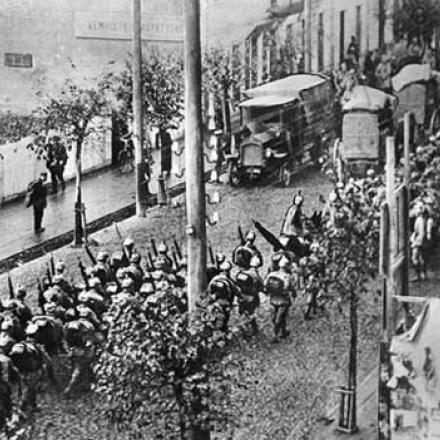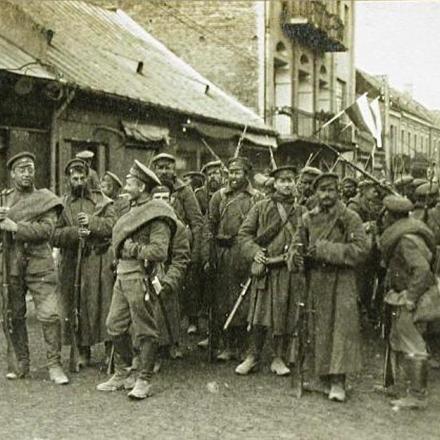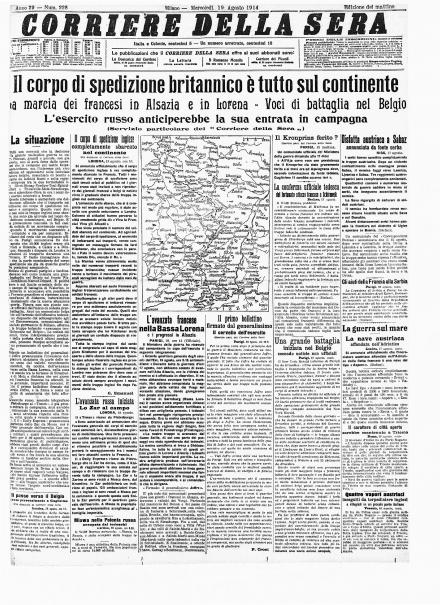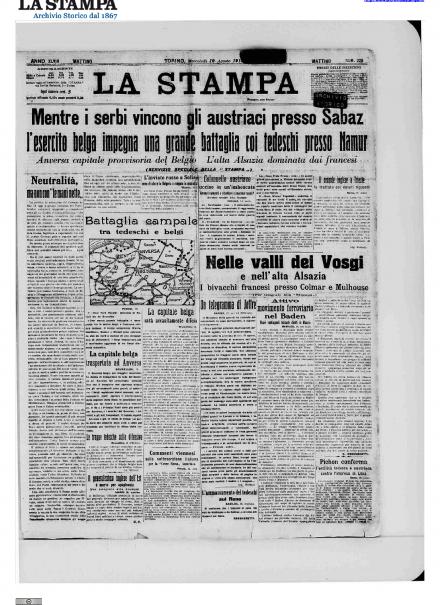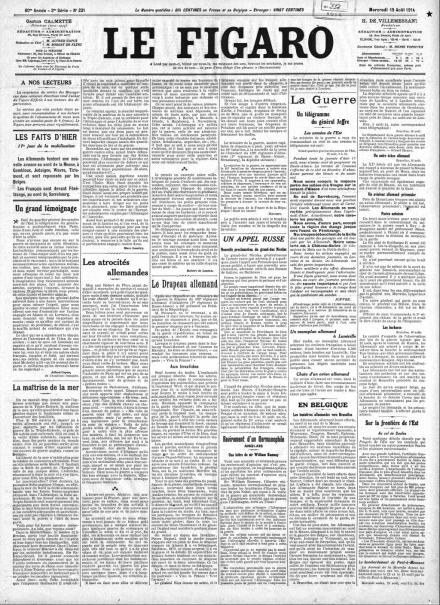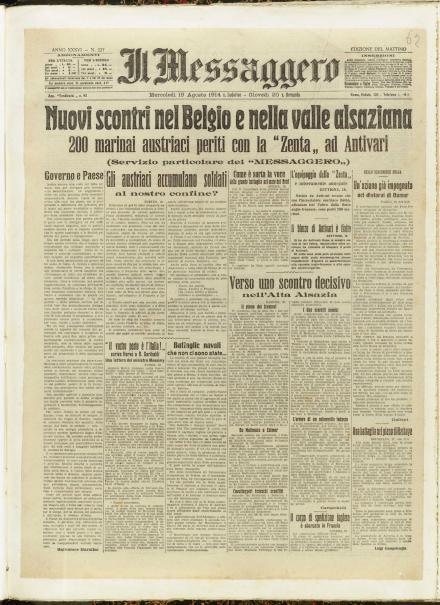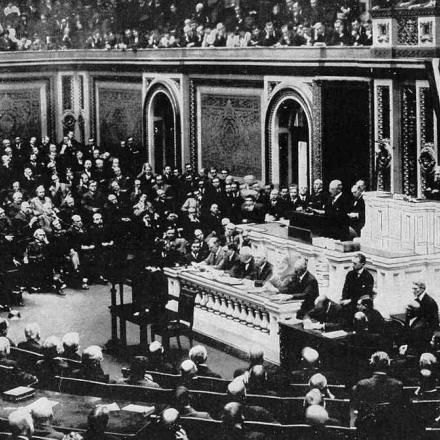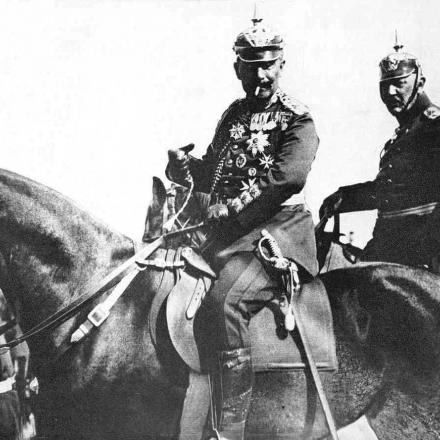La neutralità americana
Il 19 agosto l’esercito tedesco conquista Leuven; quello belga prosegue la ritirata su Anversa. Il piccolo e coriaceo Belgio è alle corde, stremato; ma in qualche modo continua a resistere. A Berlino nessuno gli dava tanto credito. Doveva essere una passeggiata di qualche giorno, ma dopo quasi tre settimane la pratica belga non è ancora archiviata.
Va peggio agli austro-ungarici. L’invasione della Serbia è di fatto fallita. L’esercito asburgico è sconfitto sul Cer e sullo Jadar e inizia a ripiegare lungo tutto il fronte. Lo dicevamo fin dall’inizio: mai sottovalutare orgoglio e combattività slave. Soprattutto quando giocano in casa.
A Vienna giunge una sola buona notizia: sul fronte orientale si è sempre più vicini a Kielce, nell’odierna Polonia.
Dall’altra parte dell’Atlantico, Woodrow Wilson annuncia la completa neutralità degli Stati Uniti. Gli americani sono unici. Con tutte le Potenze europee impegnate nella guerra, indovinate chi si è preso il compito di amministrarne gli affari? Esatto, proprio gli yankee.
Wilson guida il paese da quasi un anno e mezzo. È un democratico, un liberal. Ha una volontà ferrea: nonostante fosse dislessico è riuscito a diventare Presidente di Princeton University.
Riceverà un nobel per la pace, meritato; ma tutto sommato resta un personaggio controverso.
È forse xenofobo, o almeno potrebbe esserlo stato. In una celebre citazione afferma di non fidarsi degli «americani con il trattino». Avete presente gli italo-americani, gli afro-americani, gli irlandesi-americani e via dicendo? Appunto.
C’è un però, il rovescio della medaglia. Tra le altre cose Wilson appoggiò il suffragio femminile e fu il padre della “Società delle Nazioni”.
Strano? Sì, come solo gli americani possono essere.
Davide Sartori
GLI AVVENIMENTI
Politica e società
- Il Presidente Woodrow Wilson dichiara la neutralità degli Stati Uniti.
- Ala es Sultaneh si dimette da Primo Ministro persiano e viene nominato Ministro degli esteri. Il nuovo Premier è Mustaufi ul Mamalek.
- Il Kaiser Guglielmo II ordina la distruzione dello "spregevole piccolo esercito del Generale francese”.
- La prima unità della spedizione Indiana “C” lascia l’India per l’Africa orientale.
Fronte occidentale
- Belgio: i tedeschi raggiungono Dinant-Neufchatau e occupano Leuven.
- I belgi vengono sconfitti ad Aerschot, Tirlemont (Tienen) e Gette e ripiegano verso Anversa.
- I francesi rioccupano Mulhouse, dopo un aspro combattimento.
Fronte orientale
- Polonia: avanzata austriaca vicino Kielce.
Fronte meridionale
- Fine della battaglia di Jadar (Zara), sconfitta degli austro-ungarici.
Parole d'epoca
Woodrow Wilson
Presidente degli Stati Uniti
Dichiarazione di Neutralità - Intervento al Congresso
The effect of the war upon the United States will depend upon what American citizens say and do. Every man who really loves America will act and speak in the true spirit of neutrality, which is the spirit of impartiality and fairness and friendliness to all concerned.
The spirit of the nation in this critical matter will be determined largely by what individuals and society and those gathered in public meetings do and say, upon what newspapers and magazines contain, upon what ministers utter in their pulpits, and men proclaim as their opinions upon the street.
The people of the United States are drawn from many nations, and chiefly from the nations now at war. It is natural and inevitable that there should be the utmost variety of sympathy and desire among them with regard to the issues and circumstances of the conflict.
Some will wish one nation, others another, to succeed in the momentous struggle. It will be easy to excite passion and difficult to allay it. Those responsible for exciting it will assume a heavy responsibility, responsibility for no less a thing than that the people of the United States, whose love of their country and whose loyalty to its government should unite them as Americans all, bound in honour and affection to think first of her and her interests, may be divided in camps of hostile opinion, hot against each other, involved in the war itself in impulse and opinion if not in action.
Such divisions amongst us would be fatal to our peace of mind and might seriously stand in the way of the proper performance of our duty as the one great nation at peace, the one people holding itself ready to play a part of impartial mediation and speak the counsels of peace and accommodation, not as a partisan, but as a friend.
I venture, therefore, my fellow countrymen, to speak a solemn word of warning to you against that deepest, most subtle, most essential breach of neutrality which may spring out of partisanship, out of passionately taking sides.
The United States must be neutral in fact, as well as in name, during these days that are to try men's souls. We must be impartial in thought, as well as action, must put a curb upon our sentiments, as well as upon every transaction that might be construed as a preference of one party to the struggle before another.
Parole d'epoca
Guglielmo II
Kaiser tedesco
Discorso alle truppe
It is my Royal and Imperial command that you concentrate your energies, for the immediate present, upon one single purpose, and that is that you address all your skill and all the valour of my soldiers to exterminate first the treacherous English and walk over General French's contemptible little army.
Headquarters, Aix-la-Chapelle
